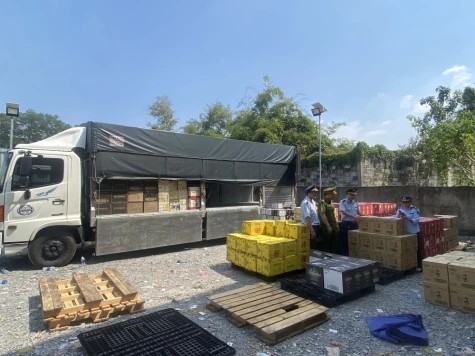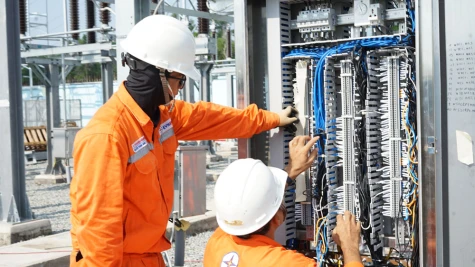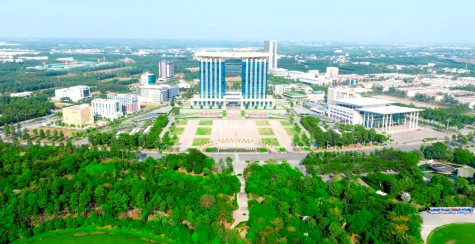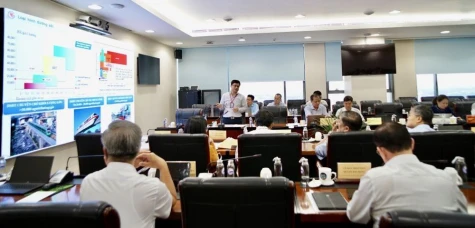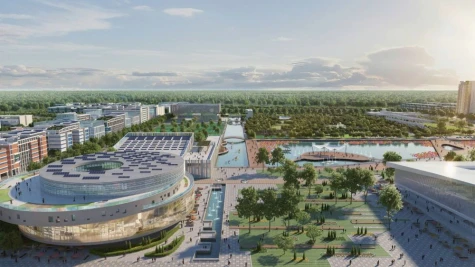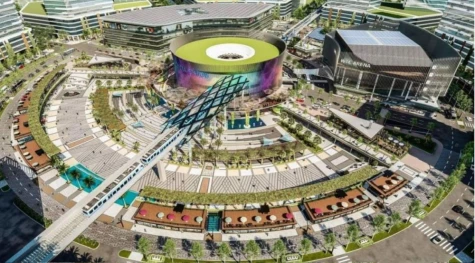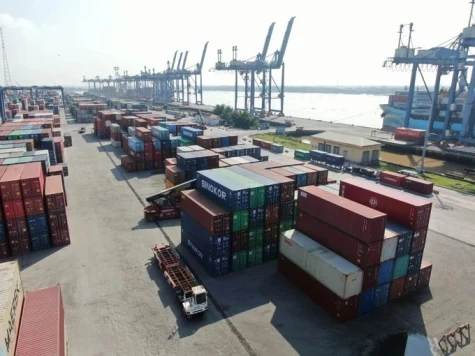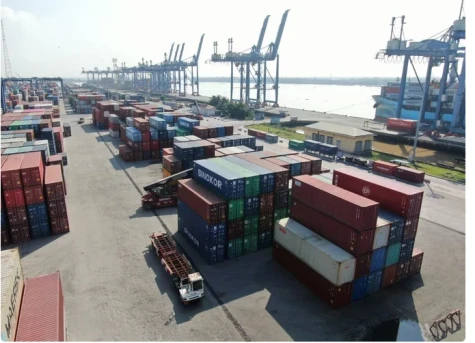Yesterday morning (May 12), a working delegation from the Ministry of Science and Technology, headed by Mr. Bui Hoang Phuong, Deputy Minister of Science and Technology, conducted a survey and engaged with the Provincial People's Committee regarding the advancement of the digital technology industry. The meeting was chaired by Mr. Vo Van Minh, Deputy Secretary of the Provincial Party Committee and Chairman of the Provincial People's Committee, who collaborated with the delegation. Also present at the meeting was Mr. Bui Minh Tri, Vice Chairman of the Provincial People's Committee.
Proactive incorporation into global value chains
In the context of a global transition towards a knowledge-based economy and high-tech industry, Binh Duong recognizes the advancement of digital technology and the semiconductor sector as pivotal strategic priorities. These initiatives aim to generate new growth drivers, bolster competitiveness, and facilitate proactive integration into the global value chain. Notably, the digital technology industry is essential for establishing a digital infrastructure platform that supports the development of the digital economy, digital government, and digital society.

Recognizing the significance and potential of this sector, Binh Duong has proactively undertaken essential initiatives in alignment with the strategic framework for the development of Vietnam's semiconductor industry through 2030, with a vision extending to 2050. The provincial planning for the period 2021-2030, with a long-term perspective towards 2050, has designated development areas for concentrated information technology and innovation zones in Thu Dau Mot City, Di An City, Bau Bang District, and Tan Uyen City. Notably, the Science and Technology Park, spanning 220 hectares, which includes the Binh Duong Concentrated Information Technology Park covering 15.47 hectares, has recently received approval from the Deputy Prime Minister for establishment, positioning it as a pivotal hub for research and development activities within the digital technology sector. This area is designed with models to foster startups and innovation, such as FabLabs, TechLabs, and Block71, with 50 hectares allocated for the semiconductor industry and an additional 50 hectares dedicated to electricity, electronics, technology equipment, software, and small-scale hardware manufacturing. Concurrently, Binh Duong is investing in the enhancement of a comprehensive technical infrastructure system, including electricity and water facilities, to expedite the operational readiness of these high-tech zones.
Addressing the meeting, Mr. Bui Hoang Phuong, Deputy Minister of Science and Technology, commended the accomplishments Binh Duong has made in advancing science, technology, and innovation. He recommended that the province collaborate closely with the Ministry of Science and Technology in executing upcoming tasks while also enhancing oversight and conducting regular inspections to ensure effectiveness. Addressing the meeting, Mr. Vo Van Minh, Deputy Secretary of the Provincial Party Committee and Chairman of the Provincial People's Committee, emphasized that Binh Duong will endeavor to fulfill significant objectives in alignment with the resolutions of the Provincial Party Committee. This includes the implementation of Resolution No. 57-NQ/TW, dated December 22, 2024, from the Politburo, which focuses on advancements in science, technology, innovation, and national digital transformation. Key initiatives involve operationalizing the Concentrated Information Technology Park, establishing a Science and Technology Park, and commencing construction of the Education-Training Complex. The province aims to transform its economic growth model by integrating scientific and technological advancements, fostering innovation, and promoting a green, circular, and knowledge-based economy. Binh Duong will enhance the leadership, direction, and operational roles of the Steering Committee for administrative reform and digital transformation, while adapting central directives to local realities. Additionally, policies will be developed to support businesses in advancing digital technology applications, with a prioritized budget allocation for digital transformation and a focus on the comprehensive development of digital infrastructure. |
In 2025, Binh Duong successfully attracted FPT University to invest in Tan Uyen City, signifying a pivotal initial step in the establishment and growth of FPT Corporation's digital technology chain within the province. Concurrently, CT Group commenced the second phase of the project to install a production line at the CT Semiconductor Chip Factory. This event, which occurred on April 30, is regarded as a foundational milestone, setting the stage for Binh Duong to further advance its semiconductor industry in the future.
In the realm of foreign affairs, Binh Duong has cultivated amicable cooperative relations with 14 localities across various countries and is an official member of three international organizations: the World Intelligent Community Forum (ICF), the Horasis Organization, and the World Trade Center Association (WTCA). In 2023, Binh Duong was honored to be the first locality in Vietnam recognized by the ICF as the leading community for its exemplary global smart city development strategy. Additionally, Binh Duong is enhancing business connections, hosting seminars, and fostering strategic cooperation with nations and regions that have developed ecosystems in digital technology and the semiconductor industry, including the United States, Japan, South Korea, and Taiwan (China).
Fostering the attraction of high-tech investors
Binh Duong Concentrated Information Technology Park spans 15.47 hectares within the 48-hectare Education - Technology Park and constitutes a vital component of the overarching science and technology ecosystem, which encompasses nearly 220 hectares. This strategic location enables the concentrated information technology park to leverage the comprehensive traffic infrastructure, urban amenities, and social services that have been systematically developed. Additionally, it serves as an "innovation core," fostering close collaboration among management agencies, research institutes, educational institutions, and enterprises to advance research and development (R&D), facilitate startup incubation, and support high-tech trial production.
The development strategy for the concentrated information technology park is founded on three primary pillars: investment in comprehensive infrastructure, cultivation of high-quality human resources, and attraction of key technology industries. Specifically, the period from 2024 to 2026 will concentrate on finalizing site clearance, leveling, and constructing essential technical infrastructure. The subsequent period from 2026 to 2028 will prioritize the mobilization of an additional 2,000 to 2,500 high-quality human resources, with a goal of attracting 10 to 15 ICT enterprises (encompassing electronics, telecommunications, and the information technology sector) and semiconductor firms to pilot the technology value chain, while also expanding pilot-line capacity to support research and development as well as testing. In the period from 2028 to 2030, contingent upon actual developments, consideration will be given to expanding the area within the 220-hectare framework, incorporating zones for medical technology, biology, and new materials, thereby establishing a comprehensive innovation ecosystem in preparation for the vision extending to 2050.

With a foundation of robust economic growth, an open investment climate, a nearly 220-hectare science and technology ecosystem, and a coordinated development strategy encompassing infrastructure, human resources, and favorable policies, Binh Duong Concentrated Information Technology Park is poised to serve as a nucleus of innovation, significantly attracting high-tech investors, particularly in the semiconductor sector, thereby positioning the province as the premier information technology and innovation center in the country.
At the meeting, Binh Duong advocated for the prompt completion of institutional frameworks, financial structures, human resources, and infrastructure investments to establish conducive conditions for attracting investors to concentrated information technology parks and science and technology parks. This initiative aims to support consulting efforts and foster the formation and development of innovation ecosystems, including business incubators, startup support centers, laboratories, R&D centers, co-working spaces, clubs, technology communities, startups, and innovation initiatives.
Reported by Phuong Le – Translated by Vi Bao









